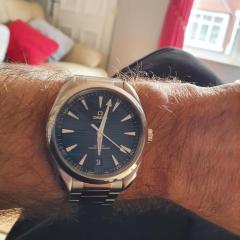Have you taken the BHI Technician DLC? Tell me your experience!
-
Recently Browsing
- No registered users viewing this page.
-
Topics
-
Posts
-
You might like to see the contraption that I made for indexing on my Chinese lathe. This is a 4 inch rotary table with dividing plates that I attached to my lathe mandrel using a drawbar. It is completely manually operated. No electronics or computer needed. I have used it to make a 60 tooth clock wheel. I use a Sherline headstock on a vertical slide to drive the gear cutter. The wheel blank is mounted on an aluminium "superglue arbor." This is the modern equivalent of a shellac chuck, and allows the wheel to be centre bored, trued and the teeth cut in a single setup, ensuring that concentricity is maintained. The finished wheel after crossing. I have not tried to make small watch parts on this lathe. The runout on the mandrel bearings may be too high for that. I won't know unless I try.
-
By coreymsnow · Posted
Y'all are very helpful, I can't thank you enough for the insights. -
By FabioBastardo · Posted
Will do. Funny it doesn’t have a makers name. -
By Neverenoughwatches · Posted
Andygsi said he was done after last week and think old hippy has gone the same way😞. I'll miss both of them, especially the old fella.





.thumb.jpg.cb17a66989f1e796fd4217db2e9ca9df.jpg)



Recommended Posts
Join the conversation
You can post now and register later. If you have an account, sign in now to post with your account.
Note: Your post will require moderator approval before it will be visible.